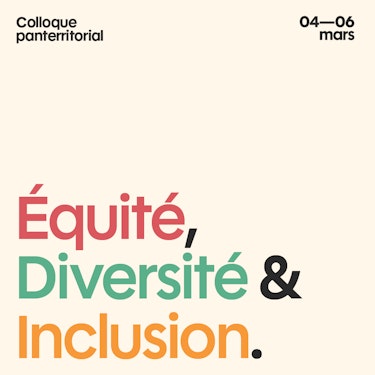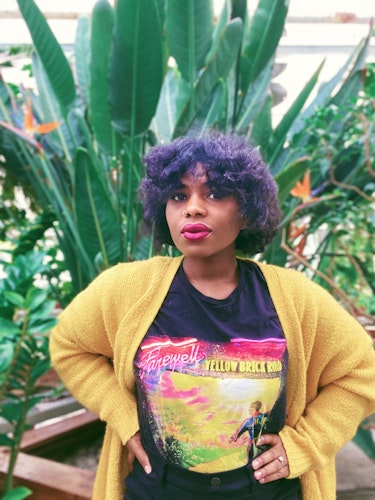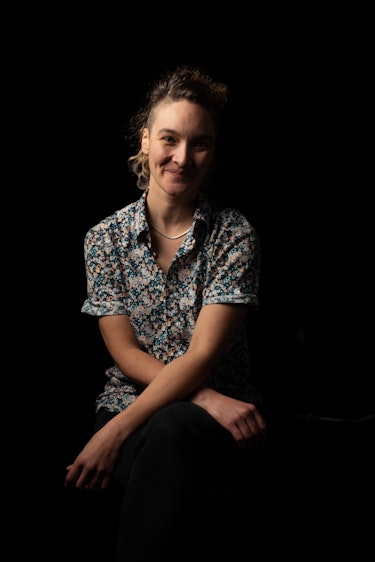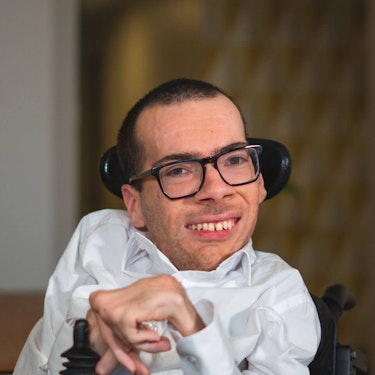Child Development Monitoring from 0 to 5 Years
This workshop offers you an understanding of the motor, cognitive, language, socio-emotional, and sensory development stages of children aged 0 to 5.
Free
Our cookies and those of our partners help improve your experience and analyze your use of the website. To learn all about cookies, check our privacy policy

Paige Galette (she), a nationally renowned consultant and community educator, opened the day with a powerful talk on the "glass cliff," a concept that extends beyond the glass ceiling by illustrating the additional barriers faced by leaders from diverse backgrounds. Her presentation sparked crucial discussions on resilience and empowerment strategies.
"Neutrality policies, or the aspect of neutrality, also mean that when you walk through the door at work, you leave your identity behind. In practice, we cannot truly enforce neutrality while claiming to uphold EDI policies." - Paige Galette (translated from French)
Backlash on Oneself. The talk shed light on the emotional and psychological impact of systemic obstacles faced by leaders from diverse backgrounds.
Workplace Backlash. An analysis of working conditions in institutional and professional spaces in the North revealed several systemic barriers:
"If your team is burned out, you don't have a team. And in the North, everyone follows suit, just like burnout. No one wants to engage in a toxic community."
A key message from this day was the importance of collective and inclusive leadership. Rather than placing all the responsibility on minority individuals, strong structural practices must be adopted. Some recommendations emerged:
Paige Galette’s presentation highlighted the need to go beyond mere symbolic commitments to EDI. Inclusion should not be a temporary stance or marketing tool but a commitment deeply rooted in organizational practices.

Paige Galette has extensive experience in governance, policy, and employer-employee relations while using anti-oppressive, anti-racist, and equity-focused frameworks. She has over 15 years of leadership experience on NGO boards. Her work has been published in the Toronto Star, the national bestseller "Until We Are Free: Reflections on Black Lives Matter in Canada," The Monitor, Francopresse, Briarpatch, and she was a biweekly columnist for the Panorama program (Radio-Canada).
With an artistic and engaged approach, Véro Lachance (they), a stage artist and educator, tackled the idealized representation of the North and its impacts on local communities. This critical perspective helped revisit dominant narratives and better understand how to build leadership that respects northern realities.
"In outdoor culture or cabin life, we often see predominantly white and privileged people viewing the land as a playground, an exciting and risky challenge, a way to push their limits, or an opportunity to reconnect with themselves. Having never known survival and having chosen to be there, they contribute to this romanticization without truly giving back to the land." - Véro Lachance (translated from French)
The discussions raised several important aspects related to how the Great North is perceived and experienced. Here are the main reflections shared during this session:
The speaker encouraged reflection on how narratives about these territories are often written by people with little real experience there and on the emotional cost this represents for those who are close to the issues.

Photo Credit: Brian Pelchat
Véro Lachance is the 13th generation of a predominantly French immigration and grew up on the unceded territory of the Waban-Aki Nation (Sherbrooke, Quebec). Their latest major theater creation project, "Dernière frontière," a documentary-fiction on the romanticization of the Great North, was presented in Quebec and the Yukon. They have lived on the traditional territory of the Ta’an Kwäch’än Council and the Kwanlin Dün First Nation (Whitehorse, Yukon) since 2017. They collaborate on various artistic projects, conduct theater workshops, teach, develop opportunities for the local drag scene, and support 2SLGBTQ+ youth.
François Bernier (he) concluded the day by sharing his inspiring journey as an inclusive leader. Emphasizing resilience and the need for greater accessibility in professional environments, he provided concrete tools to advance EDI in daily life.
“I could never have done Montréal - New York in a wheelchair without my friends, I would never have survived my time in the hospital without my family, I would never have started my business without the support of the online community. For a person with a disability, community is something vital. Don’t be afraid to show your support, to encourage the efforts of these individuals, and to ask questions.” - François Bernier (translated from French)
François Bernier’s presentation highlighted practical strategies to strengthen inclusivity and resilience in our professional and community environments. His central message: obstacles—whether physical, cultural, or social—are invitations to innovate and co-create solutions that benefit everyone.
Here are some key concepts discussed during the session:
François emphasized the importance of accessibility in an inclusive environment. He provided several concrete measures to remove physical, cultural, and organizational barriers. Among his suggestions:
François Bernier stressed that if one member is left behind, the entire community suffers. He illustrated this principle with examples of pairing initiatives: connecting isolated individuals—whether an elder, a newcomer, a person with a disability, or a member of an Indigenous or other vulnerable community.
François also discussed the importance of showcasing individual successes within marginalized communities. He proposed creating a digital showcase of talents to highlight the journeys of those who have overcome barriers and inspire others. This could take the form of a Facebook page or a dedicated section on a website where success stories are shared, motivating young people to push beyond their own limits.
François Bernier concluded his presentation with a powerful message: "Every obstacle is an invitation to innovate."In the face of challenges, he advocated for individual and collective initiative to overcome barriers and build inclusive and supportive communities. His journey, marked by resilience in the face of a degenerative disease, perfectly embodies this philosophy: never accept being limited by obstacles, but instead, use them as stepping stones to move forward—together.

François Bernier has built his personal and professional brand on fundamental values such as integrity, collaboration, and teamwork. His disability, a complex physical condition, has shaped an exceptional determination that enabled him to complete advanced studies in business strategy at HEC Montréal. As a manager and co-founder of Horizon B2B, François and his team support businesses in Québec, Canada, and the United States in developing authentic and transformative business relationships. A committed advocate for universal accessibility, he organized a demonstration to raise awareness among decision-makers and encourage concrete actions to make infrastructures and services accessible to all. He also supports organizations in their efforts to hire inclusively and effectively integrate talent from diverse backgrounds.
Follow him on LinkedIn.
Loading
Thank you for subscribing